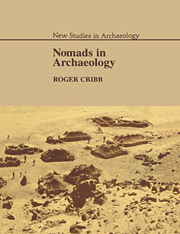Book contents
- Frontmatter
- Contents
- List of illustrations
- List of tables
- Preface
- 1 Introduction
- 2 Origins and definitions
- 3 Nomad pastoral economy
- 4 Residence, descent and territory
- 5 Nomads – the invisible culture?
- 6 Nomad architecture and domestic space
- 7 Ali's camp: a nomad household campsite
- 8 The structure and location of nomad settlements
- 9 Sariaydin Yayla
- 10 The lost world of Nemrut Daḡ
- 11 Nomad archaeology: an assessment
- 12 Towards a model of unstable settlement systems
- References
- Glossary
- Index
1 - Introduction
Published online by Cambridge University Press: 23 September 2009
- Frontmatter
- Contents
- List of illustrations
- List of tables
- Preface
- 1 Introduction
- 2 Origins and definitions
- 3 Nomad pastoral economy
- 4 Residence, descent and territory
- 5 Nomads – the invisible culture?
- 6 Nomad architecture and domestic space
- 7 Ali's camp: a nomad household campsite
- 8 The structure and location of nomad settlements
- 9 Sariaydin Yayla
- 10 The lost world of Nemrut Daḡ
- 11 Nomad archaeology: an assessment
- 12 Towards a model of unstable settlement systems
- References
- Glossary
- Index
Summary
Persian, I have never yet run from any man in fear and I am not doing so from you now. There is, for me, nothing unusual in what I have been doing: it is precisely the kind of life I always lead, even in times of peace. If you want to know why I will not fight, I will tell you. In our country there are no towns and no cultivated land; fear of losing which, or seeing it ravaged, might indeed provoke us to hasty battle. If however you are determined upon bloodshed … one thing there is for which we will fight – the tombs of our forefathers. Find those tombs and try to wreck them, and you will soon know whether or not we are willing to stand up to you.
(Herodotus, The Histories, Book IV, 125)The defiant reply of the Scythian chieftain Idanthyrsus to Darius, King of Persia, contains a number of points of interest to any student of nomadic pastoralism as an anthropological and historical problem. The ceaseless cycle of mobility, the lack of fixed assets and the military advantages which flow from both – all are common themes in the anthropology of Near Eastern nomadism. Historians receive the occasional glimpse of nomadic cultures and life ways, such as the above.
- Type
- Chapter
- Information
- Nomads in Archaeology , pp. 1 - 8Publisher: Cambridge University PressPrint publication year: 1991
- 2
- Cited by



